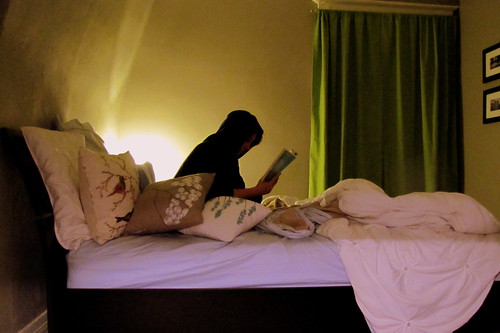 |
| http://www.flickt.com/, photo by Heather Kaweck |
Of course, most of us aren't going to go for days or weeks without any sleep. Instead, we harm ourselves in a much more subtle way by getting less sleep than we need, which is about 8 hours a night. Perhaps it doesn't seem like much if we miss just an hour or two a night, but if you add all of those hours up over the course of a year, it turns into hundreds of hours of lost sleep.
You probably already know that getting enough sleep is essential for mental clarity, stable and positive moods, organ function, and your body's ability to heal, but did you know that it is also a great way to lose weight?
I've always been told that the average adult burns about 70 calories an hour sleeping, so I honestly didn't mind much if I lost an hour or two of sleep. I figured I might actually lose more weight by sleeping less, since my body burned more calories while I was awake and in motion, right?
Wrong!
Some scientists believe that getting enough sleep is directly tied to the hormones that suppress your appetite, and that when you get enough sleep, you're much less likely to overeat. However, there's more involved than that. Studies show that people who sleep less tend to weigh more, even when they don't eat more. How can this be?
It's been suggested that your body actually steps into an increased fat burning mode during those last couple of very important hours of sleep. If you miss out on those final hours, you've missed out on some super easy, comfortable, fat burning time!
Sounds great, right? But if you have a hard time falling asleep at night, this can be easier said than done. You may lay awake, tossing and turning, your stress continuing to climb as you watch the minutes tick by, realizing just how few hours you have left to sleep before the alarm goes off.
If you're having a hard time sleeping at night, try the following tips for a better night's sleep:
1. Exercise. Getting up and moving during the day can do wonders to help you fall asleep at night. Take a walk around the block, lift weights at the gym, or try surge training. I love how tired my body gets (and how well I sleep!) after just a few minutes of surging.
2. Don't work in bed. I know, it's comfortable to slip on those cozy pj's, prop up a pillow, and get some work done in bed before falling asleep, but this can make it harder to fall asleep. Do your work in another room, then snuggle up in those sheets when you're actually ready to go to sleep.
3. Turn off the screens. Researchers think that when we look at a screen, our sleepy brains sort of wake back up in response to the light from the screen, making it harder for us to fall asleep. Give yourself about an hour without screens before you try to fall asleep.
4. Stay on a schedule. This is hard, I know, especially on the weekends, but if you go to sleep and wake up at about the same time every day, your body will expect to sleep at a certain time, therefore making falling asleep easier.
5. Set a routine. I used to read about this in parenting books when my kids were babies, and I think it's also true for adults. Before bedtime, engage in a familiar routine, which will help wind your body down in preparation for bed. Whether it's stretching for a few minutes, reading a book, turning off all the lights in the same order every night, or listening to relaxing music, keep it the same, as much as possible, to help you wind down and prepare for sleep.
Let's get some great sleep tonight to burn fat and keep our bodies healthy!
I can certainly relate to this but now I have something to blame my weight gain on. I don't have a problem getting to sleep but I do have a problem staying asleep. I am losing out on those last and most productive hours. Any ideas there?
ReplyDeleteRobert, I looked this up and it seems like the experts prescribe pretty much the same things to keep you asleep as they do to help you fall asleep: http://www.mayoclinic.com/health/insomnia/AN01611
ReplyDelete(I'm not a fan of yoga, but I like the other tips in this article.)
I really do think exercise makes a huge difference. Seems like when a person gets some great exercise and fresh air, they sleep so much better. Of course, stress can take away some of those benefits, but the exercise can also help reduce the stress.
Sorry I don't have any better tips than that!